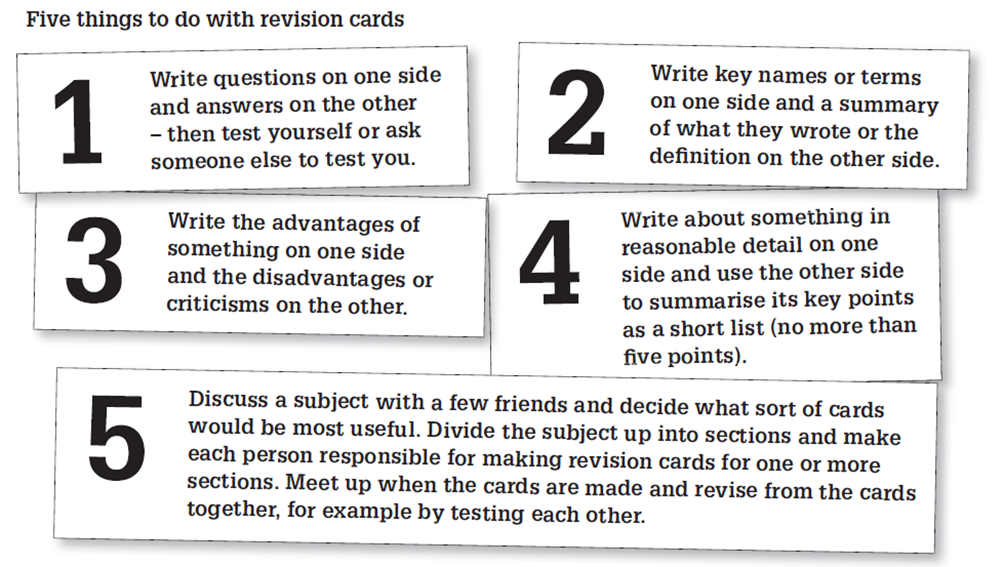Our weekly blog has been written by Mr Bolton, Head of Key Stage 4, who advises on how to get the most out of revision by keeping active, getting creative and eating the best brain power foods.
Revision: A guide to support your child at KS4
With GCSE examinations well under way, it may be that you are approaching this half term considering how you can support your child in their active revision at home. I am pleased to say that revision has certainly moved in a more focussed direction since I was at school. Research indicates that copying notes from a text book will not necessarily support examination success and instead here are some top tips on how to build on memory recall and examination technique for your child this half term.
Why not try these examples of Active Learning?
- Get active: Get them to note key points, make links in a spider diagram/mind map.
- Get creative: They could draw a picture, write a story, get the playdough out – or pretend to be interviewed about it on a chat show and unleash your inner Michael Parkinson.
- Test themselves: This forces the brain to practise retrieving the information from its memory banks, use past papers found on any exam board website.
- Explain it to someone else… and get them to ask you questions: Their brain will work with the material in a new way, which will help to lodge it in their long-term memory. If they can’t answer a question, you know they need to revise it a bit more.
- Rehearse it: Make sure they look back over what they have learned at the end of every session to consolidate the memory, and have another quick look the next day. Use it or lose it.
- Sleep on it: Our brains will rehearse the information but without any effort from your conscious self… Studies show that recall really does improve after you sleep – and similarly, marks go down if you don’t get enough sleep.
Memory techniques: Roman Room
Mentally picture a room in your house and select several items in it. For example: your bedroom = your bed, your lamp, your PC, your wardrobe… The basis of the Roman Room system is that things to be remembered are associated with these objects, so that by recalling the objects within the room, all the associated objects can also be remembered.
- Mentally place the information on / in / under / next to these places in your room – remember that the more unusual you can make these connections the better – you can use images to help you remember.
- Mentally you can then walk around your room reciting your information.
- The items in your room act as prompts for the information and the route you take around the room helps you remember the sequence.
- At home you can physically put post-its with the information on these items of furniture and walk your route using a different room for each question.
Making Revision Cards
Revision cards are a popular revision resource. The idea is you summarise Some information on a blank post card or post it note (front and back if necessary). You can make them by going to www.getrevising.co.uk

Some final revision tips for success
Get your child you share their revision timetable so you can help by allowing a studious atmosphere.
- Put away their Smartphone. If they are texting someone when they are revising it is not conducive to effective revision. Removing temptation is the best option. Likewise, if they are revising using their laptop do not have social media running in the background. Be a realist: these are going to be a distraction that will affect the quality of their revision.
- Eat properly. Their mind needs to be fit and ready. Good brain foods? Wholegrain foods (cereals, wheat bran, and whole wheat pasta). Blueberries. Blackcurrants. Broccoli. Tomatoes. Oily fish. Nuts and bananas will give a longer lasting boost than eating a chocolate bar.
- Take breaks. Do you know that the first 15-20 minutes of revision in each session will be their most productive? So get them to stop for a few minutes every 30 minutes, even if it is just to close their eyes and relax. Unless of course you’re doing a timed paper..!
- Get them to challenge themselves. Or, you can help! Ask them if you can flick through their notes and ask you some questions. If they can’t answer any of their selections, note the topics down so they can re-learn them after.
- Don’t be daunted by the amount they have to do. Breaking down their revision into small chunks will make each day and even each session more manageable. If they take it one session at a time and keep up, you will be amazed by how much they can achieve.
All of the techniques above are not exclusively for Year 11. I am certain any child in any year at Bethany School would be grateful for your input in their revision!
Mr Bolton
Head of Year 11

